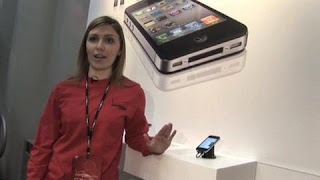
Meet the new iPhone - somewhat the same as the old iPhone.
Powered off, the Verizon Wireless version of Apple's iPhone 4 that's now in stores differs only at the margins from the AT&T model that's been available since last summer: The Verizon model has one extra black line on its outside edge, a bigger ring/vibrate switch and no SIM card slot.
The software on the Verizon iPhone also offers few differences from what's on the AT&T iPhone. At its introduction last month, Verizon touted a WiFi sharing feature that's more capable than the single-computer tethering option AT&T provides - but AT&T is supposed to get the same feature within days.
Bigger variations surface in Verizon and AT&T's pricing. Both charge new and renewing customers the same for the phone itself - $199 for a model with 16 gigabytes of storage and $299 for a 32GB model, with two-year contracts required - but their service plans don't match up.
AT&T sells voice, messaging and data separately, and you can spend considerably less on AT&T for more restricted service - $54.99 a month buys you 450 minutes of anytime calling at $39.99, 200 megabytes of data at $15, and no texts included. Then again, adding a more realistic 2GB "DataPro" option and a $10 bundle of 1,000 messages brings AT&T's iPhone cost to $74.99; upgrading to unlimited texting pushes it to $84.99.
Verizon, meanwhile, offers only one, unlimited data plan for $29.99 (though it reserves the right to brake the access of customers it considers overusers). Its 450-minute calling plan costs $39.99; you can buy bundles of individual messages, as at AT&T, up to $20 for 5,000. Or you can pay $59.99 for 450 anytime minutes plus unlimited messaging, the recommended entry-level plan on Verizon's site. Your monthly bill will run at least $69.98, with unlimited texting bumping the total to $89.98.
(Comparable combinations of unlimited smartphone data and texting, plus 450 minutes of anytime calling, costs $79.99 from Sprint and T-Mobile.)
AT&T and Verizon charge $20 extra for tethering and WiFi hotspot capability, respectively. But AT&T's option doesn't add to the 2GB cap of the required DataPro plan, so it can quickly inflate your bill with overage fees of $10 for every extra gigabyte.
The biggest difference is outside the phones themselves - the network they're on. Many people have been yearning for a Verizon iPhone mainly because AT&T has had so much trouble keeping its iPhone users connected - they've had calls drop or been unable to get online at all, even while their iPhones show four or five bars of a 3G signal.
AT&T counters that its system allows you to talk and surf the Web at the same time, while Verizon's technology doesn't permit that. You can also use an AT&T iPhone in many more countries overseas, albeit at steep roaming rates.
Verizon has a much better reputation for network capacity and performance. Will that reputation survive the iPhone's arrival? We won't know for sure until weeks or months from now, when problems have had more time to surface.
skip to main |
skip to sidebar
Technology is the process or like that technique by which humans modify nature or surround to meet their needs.But technology is more than these tangible products. We can growth to technology in any field. By technology we made comfortable & luxurious.Technology is the part of engineering.
Technology News
Total Pageviews
Categories
- 24 hours without my iPhone (1)
- iphone New (1)
- Latest Mobile News (5)
- Latest Nokia Reviews (3)
- Mobile News (1)
- Mobile Technology New (1)
- Nokia 225 phone (1)
- Pay with your phone for rewards (1)
- Phone Review (1)
- UPS Services and Management (1)
Texts
Download
Followers
Powered by Blogger.
Popular News
-
Product Introduction 1. Main Features Non built- design, forever. 1) Non built-in battery design,DON’T replace battery forever. SMS. 2) Full...
-
Some people are so concerned about the possibility of harmful radiation from Japan they have started their own do-it-yourself backyard radia...
-
Main Features 1、 Fully support owner checking and operating GPS tracker by SMS, search the car in the internet. 2、Can position even no GPS s...
-
The perfect Windows phone for those on a budget The wallet-friendly Lumia 710 packs a 1.4GHz single-core processor and 512MB of RAM, but use...
-
PRICE IN INDIA 6,850 View Stores TECH2 RATING 6.5 AVERAGE USER RATING 1 2 3 4 5 6 7 8 9 10 11 12 13 14 15 16 17 18 19 20 8.0 Write a Revi...
Labels
- 24 hours without my iPhone (1)
- iphone New (1)
- Latest Mobile News (5)
- Latest Nokia Reviews (3)
- Mobile News (1)
- Mobile Technology New (1)
- Nokia 225 phone (1)
- Pay with your phone for rewards (1)
- Phone Review (1)
- UPS Services and Management (1)
Recent Posts
Blogger Tricks
Blogger Themes
Footer Widget 1
Footer Widget 2
Footer Widget 3
Copyright © 2011 Technology | Mobile Technology | Electronics Technology | Computer Technology | Powered by Blogger
Design by Free WordPress Themes | Bloggerized by Lasantha - Premium Blogger Themes | Premium Wordpress Themes







0 comments:
Post a Comment